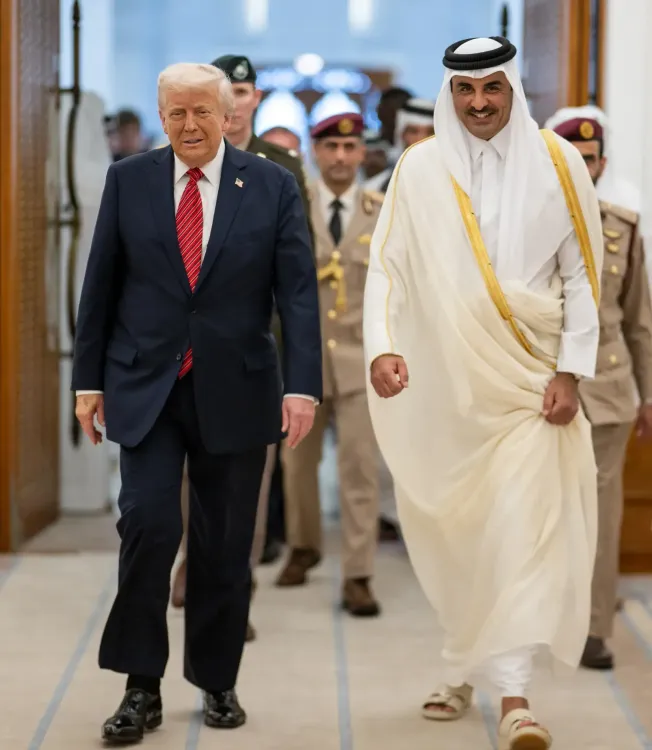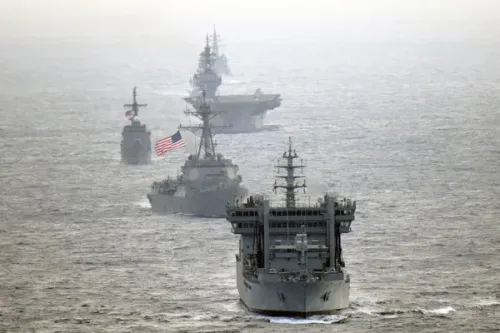Is Trump Offering Qatar Unprecedented Military Protection Against Attacks?

Synopsis
Key Takeaways
- Trump's unprecedented military protection for Qatar signifies a major shift in US policy.
- This guarantee draws a red line for Israel, restricting attacks on Qatari territory.
- The executive order reflects principles similar to the NATO treaty.
- Qatar's role in regional diplomacy is more critical than ever.
- The situation highlights the complex dynamics in US-Middle East relations.
New York, Oct 2 (NationPress) In light of an Israeli strike on Qatar, which jeopardized the Gulf state's relationship with the US and jeopardized peace initiatives in Gaza, President Donald Trump has provided an unprecedented military protection guarantee.
The White House announced on Wednesday that Trump's executive order stipulates that the US will interpret any aggression against Qatar as a direct threat to its own national security and will respond with military action.
Notably, this order was signed on Monday, coinciding with Israeli Prime Minister Benjamin Netanyahu's visit to the White House.
During Netanyahu's visit, Trump introduced a peace blueprint for Gaza, claiming support from Qatar, other Arab nations, and numerous Muslim-majority countries.
This military guarantee establishes a red line for Israel, declaring Qatari territory as off-limits for any attacks.
The executive order reflects the principles underlying the NATO treaty, which posits that an attack on one member is considered an attack on all.
However, it is important to note that Trump's commitment to Qatar does not constitute a treaty, which would necessitate Senate approval.
Qatar remains a significant, albeit occasionally contentious, ally of the US, hosting a substantial military installation.
In 2022, former President Joe Biden acknowledged Qatar as a major non-NATO ally.
The Israeli assault on a building in Doha on September 9 resulted in the death of a Qatari internal security officer, placing Trump in a complex position between two allied nations.
Israel asserted that the operation targeted Hamas leaders present in the building, who ultimately remained unharmed.
This incident embarrassed Trump and raised doubts about US credibility, as the Qatari government was facilitating negotiations for peace in Gaza under US guidance.
The US government stated that Israel did not seek US consultation prior to the attack, informing Washington only moments before it commenced, rendering the US warning to Doha ineffective.
As the center of regional diplomacy, Qatar often finds itself in a sensitive position, hosting various conflicting nations or factions.
Taliban representatives have also engaged in diplomatic discussions from Qatar.
Trump's assurance would extend protection to Qatar against potential attacks from other nations as well.
In June, Iran targeted the US Al Udeid Air Base in Qatar as a reprisal for US actions against its nuclear facilities.
According to reports, Trump's special envoy for the Middle East, Steve Witkoff, has been negotiating to resolve the Gaza crisis and has met with Hamas leaders in Qatar.
Israel's strike in Qatar might have aimed to obstruct a Gaza peace agreement that conflicts with the objectives of Netanyahu's far-right supporters, who aspire to seize the territory and establish Jewish settlements.
While Netanyahu was at the White House, Trump facilitated a phone call between him and Qatar's ruler, Al Thani, for an apology.
The White House reported that Netanyahu expressed regret for violating Qatari sovereignty while targeting Hamas leadership during hostage negotiations and assured that Israel would refrain from such actions in the future.
As a gesture of goodwill, the emirate presented Trump with a Boeing 747 during his visit in May, and it has pledged to invest over $500 billion in the US over the next decade.










